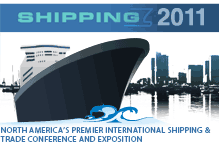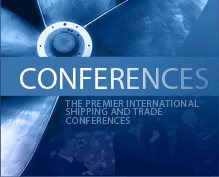
Greek Shipping Analysed in Terms of Type of Vessel
This is the second of a two part research analysis of the types of vessels
managed by Greek shipping companies.
By Ted Petropoulos, MD of Petrofin S.A. and
Isabella Constantinidou, Research Analyst of Petrofin S.A.
IThus far…
In the previous issue we examined the patterns of ownership according to type of vessel that emerge in the smaller fleets, i.e. 1-2, 3-4 and 5-8 vessel fleets. From the examination of these fleets the following distinct trends have emerged:
1. 84.4% of the entire Greek shipping presence belong to the smaller fleet categories (i.e. 705 shipmanagement companies managing 1,960 vessels), out of which 71.12% of these vessels are overage, namely over 20 years of age (i.e. 1,394 vessels out of 1,960).
2. The younger the fleets the more specialised they are, whereas the older the fleets the more fragmented in terms of types of vessels. Continue Reading
FROM THE PAGES OF FRESHLY MINTED
Below are some of the highlights from recent weeks of our weekly web-zine, “Freshly Minted”. If you are not a subscriber to FM, you should be. It is the only place where insight is brought to the recent ship finance news weekly and online. Check out www.marinemoney.com and get familiar with the many topics we cover each week.
FM December 14 2000
A Prophetic Call on Marine Transport Corp. as Crowley has now offered $7/share….
MTLX NEW
HIGH, SURPRISE SURPRISE
Our forecast for MTLX made in Sept. 1998 missed its mark by a year. Back then we got most of the facts straight and predicted a share price of $6 to $7 in Q4 1999:
• Increased ANS oil production does now appear likely under a Bush presidency.
• MTLX’s bids to operate ships for the Military Sealift Command under two contract were both upheld.
• Ordering of new Jones Act tankers in large numbers has not materialized as formerly excluded CDS-built ships have supplemented supply and high US building costs have moderated demand — Tug-barge units may ultimately pose the greater challenge to self-propelled coastal tankers, even if for all the wrong reasons.
Continue Reading
A Year of More Corporate Credits and Less Stuffees
By Matt McCleery
If the Year 2000 was the Year of the Tanker for shipowners, it was also the year of the tricky syndication for bankers. This trend, which began in 1999, gathered steam in 2000 and resulted from the fact that the number of participants, or “stuffees”, and arrangers are moving in opposite directions.
The lack of participants in shipping finance deals was exacerbated when a number of big deals including Bergesen ($700m), OSG ($350m), Cosco ($325m) and Odjfell ($300m) all came to market around the same time and soaked up lending capacity. Bergesen and Cosco were successfully syndicated, OSG less so and Odjfell hardly at all.
Continue Reading
Shipbroker of the Year, 2000
Shipbrokers take a lot of crap in the ship finance industry. They are openly criticized for giving away information for free, surviving on a steady diet of gossip and being unjustly enriched for doing nothing but gabbing on the telephone. Remember the shipping industry’s first reaction to the internet- that shipbrokers would be a thing of the past.? To these criticisms we say Bah Humbug!
Shipbrokers are deal-makers par excellence. These warriors go out onto the battlefields of shipping without the armor of a balance sheet or a fleet of ships to protect them, wielding only their relationships and their ability to identify value and create transactions.
Continue Reading
Best Shipping Bank of 2000 – Chase Securities, Inc.
The shipping desk at Chase has been very busy this year. Actually what we find most interesting about Chase is that their shipping desk is active every year, but generally with different kinds of deals. There are a couple of reasons why Chase was busy this year. Firstly, Chase has a significant expertise in the tanker sector and are lead banker to some of the biggest tanker companies in the world including Bergesen, Stena, Metro and Hellespont. Deals involving those companies totalled more than $1.5 billion alone. Since 2000 was the year when the tanker market turned up, there were a lot of financing, and refinancing, deals getting done for both second hand tonnage and newbuilding deliveries.
Another factor that accounted for the tremendous amount of business done at Chase this year was high yield restructuring, where Chase was able to combine its shipping skills and relationships with the bank’s balance sheet and reorganization team to add value to a very difficult process.
Continue Reading
Research 2000: ANALYSTS OF THE YEAR
When we decided to do the Analyst of the Year Award we were faced with a choice of two different options. We could either go blindly by the analyst’s company picks and choose the one which would have made the greatest return for investors following his stock picks, or we could try and find the analyst that not only has a very good understanding of the companies and its financials but also has a good understanding of the shipping markets. The former is tangible but limited, the latter is intangible but more flexible.
With a volatile industry like shipping, where stocks are as unpredictable as the freight rates, we feel that it is important for an analyst to be able to use his own understanding of the markets and add that to his knowledge of the specific company in question. Analysts that rely too much on third party information tend be followers rather than leaders, and if you want to make money on stocks, one must act fast. So we have chosen to focus on a select few reports that we think show exactly this.
Continue Reading
Ospreys Too Deliver
By Geoff Uttmark
If you thought only storks bring little bundles of joy, you are mistaken; add Ospreys to the list. In “Searching for Solid Investments in LNG” (MM Vol 15, No. 11) the article ended with “… we look for a strong recovery in Osprey common.” That was one year ago and Osprey was trading at $S 0.58 (USD $0.37). It was also long before the Singapore-traded Company gained broader coverage on the back of a takeover bid from Fredriksen controlled World Shipholding, Ltd. of Norway.
Our recommendation stemmed from forecasts of increasing growth in the use of natural gas – particularly in Asia which was then showing early signs of recovery, and the fact that Osprey Maritime represents one of the very few public plays in seaborne transport of LNG. While neither an absolutely pure LNG play, since Osprey also operates product tankers and VLCCs, nor possessing of a mighty balance sheet, Osprey did represent in December 1999 a reasonable speculation that it’s future loomed brighter than its recent past. Ship owners know something about “reasonable speculation” and John Fredriksen in particular saw it our way.
Continue Reading
Marine Money’s Favorite & Rawest Shipping Deals of 2000
People often say that things move slowly in the world of ship finance, and perhaps they’re right. In a world in which people expect things to happen with the click of a mouse, shipping plods along. Still, every year when our editorial team sits down to nominate our favorite and rawest ship finance deals of the year, we are amazed at how many deals there are to choose from, in both categories. Deals may not get done overnight in our industry, but shipping transactions, like ships themselves, steam on around the clock, around the world and around the shipping cycles.
A few footnotes and exculpatory disclaimers before we begin. First of all, everything that you will find on the following pages is subjective, so we would be surprised if there weren’t some differences of opinion. Secondly, we all know that shipping deals are tricky and that every single one has a story, but unfortunately we don’t have enough pages to include them all in this issue of Marine Money.
Finally, you will see quite a lot of references to deals involving Golden Ocean Group. In fact, if we were to choose a single Best and Worst deals of the year, Golden Ocean might well hold both of those titles as well and that says a lot.
Enjoy!
Continue Reading
Shipping Merchant Bank of 2000 – American Marine Advisors
The bullet points below are as instructive for what isn’t there as for what is. While AMA was extremely busy, and made lots of money with high yield restructuring work this year, we think the bank will actually be much more active next year. If you look at the non-high yield related deals that AMA did this year, it is clear that the organization is comfortable working across the spectrum of ship finance. From the representation of whales like OSG to minnows like BT Shipping to the carefully choreographed Thor Dahl transaction, AMA had made it clear that they are equally comfortable and competant working with shipping companies and investors of all shapes and sizes in the formation of all kinds of capital for shipping.
Continue Reading
Oil Majors’ Acquisition Techniques
By Koon Lee of Compass Maritime Services LLC
With OPA90 and numerous industry regulations enacted within the last decade, major oil companies were faced with the task of replacing their aging fleets. Coupled with a period of low crude prices that placed a burden on limited corporate funds and the drive to generate 12+% return on capital employed (ROCE) to meet Wall Street expectations, and remain competitive, the oil companies were forced to develop new and innovative, “out of the box” solutions to replace their tonnage requirements. No longer do oil majors use their own equity capital to fund vessel acquisitions, instead various types of lease arrangements were concluded. The purpose of this article is to summarize each major oil company’s strategy in acquiring replacement tonnage over the past decade.
Continue Reading







